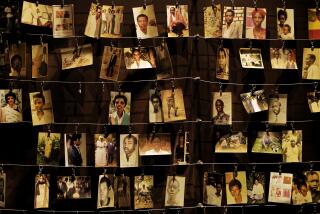Myths of ‘realistic’ foreign policy
- Share via
Re “Tyranny, realism and Jeane Kirkpatrick,” Current, Dec. 17
David Rieff asserts that “liberalism and realism are too uncomfortable a fit to be enduring.” That is, we have an either/or choice to take out repressive dictators (liberalism) or to ignore their repressions for the sake of stability and eventual political evolution (realism). Such a position is bad logic and worse foreign policy.
“Realistic liberalism,” to use Rieff’s terms, was doing all right with Iraq during the 1990s, containing Saddam Hussein, greatly diminishing his civil rights abuses and wrecking his weapons of mass destruction aspirations. But that wasn’t acceptable to the current administration. Of course a mixture of liberalism and realism is messy, but so are foreign affairs.
DAVID EGGENSCHWILER
Los Angeles
*
Rieff expresses a simplistic view of realism. Realistic policies do not necessarily translate into overthrowing left-wing dictatorships (and democracies) and installing right-wing dictatorships.
The reality is that our actions for or against foreign governments are sometimes for perceived national security reasons, and more often than not for the benefit of the business interests of our corporations. And they are always at the expense of the human rights of the citizens in those countries.
Jeane Kirkpatrick and other “realists” fail to understand that these human rights violations are immoral and create varying degrees of hatred against our hypocrisy. Rieff also fails to point out the fallacy in Kirkpatrick’s ultimate goal being democracy because Chile, Iran and other governments we overthrew were already democracies. Often the “existential threat” is less real than the “realists” would have us believe.
MICHAEL GOLDMAN
Woodland Hills
*
Rieff’s statement that Augusto Pinochet’s Chile “was precisely the sort of authoritarian tyranny Kirkpatrick had in mind” is wrong. The military intervention led by Pinochet ended decades of elected government and modern civil discourse in Chile. Kirkpatrick may have admired Pinochet, but she did not write that opinion in the “Double Standards” article because the example of Chile would have undermined her argument. What Rieff refers to as Kirkpatrick’s “icy calculus” -- her ability to build a rational argument for an unpleasant topic -- is absent among her “current admirers in the administration.”
KAREN MEAD
Santa Barbara
More to Read
The biggest entertainment stories
Get our big stories about Hollywood, film, television, music, arts, culture and more right in your inbox as soon as they publish.
You may occasionally receive promotional content from the Los Angeles Times.










